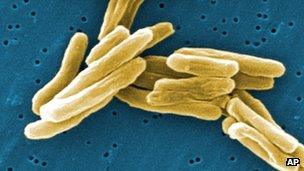Rise in UK drug-resistant tuberculosis cases
- Published

The number of overall cases year-on-year remains stable at between 8,500 and 9,000
Cases of drug-resistant tuberculosis (TB) in the UK have risen by over a quarter in the last year, the Health Protection Agency (HPA) has revealed.
In 2011, 431 cases did not respond to antibiotic treatment compared to 342 in 2010, the HPA said. About 550 more cases of TB were disgnosed in 2011.
The agency said it was disappointed by the increase which "remains a concern".
TB is a bacterial infection that mainly affects the lungs but can be found elsewhere in the body.
Overall, just under 9,000 new cases of TB were recorded by the HPA in 2011, up from about 8,400 in 2010.
Professor Ibrahim Abubakar, head of TB surveillance at the HPA, said he was pleased that the number of overall cases year-on-year remains stable at between 8,500 and 9,000.
But he said: "The increase in drug-resistant cases remains a concern and a challenge to our efforts to control TB in the UK."
He added that the infection "continues to disproportionately affect those in hard to reach and vulnerable groups" such as foreign migrants.
Prof Abubakar urged health commissioners in the worst affected areas to prioritise the delivery of services and treatment.
TB can be spread when someone with the infection coughs, sneezes or talks and another person breathes in the bacteria. However, prolonged contact is usually needed for infection to occur.
Typical symptoms include a persistent cough, night sweats for weeks or months, weight loss, fatigue, high temperature and shortness of breath.
- Published23 March 2012
- Published14 September 2011
- Published3 June 2011